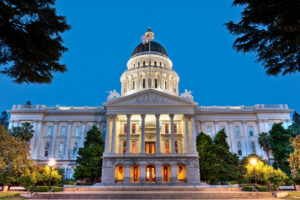
California passes nation’s first broker deletion bill, invests $106M in hydrogen infrastructure
By onLegal
California’s legislature has been abuzz with automotive-related activity throughout the past week, including a $106 million deal to build hydrogen refueling stations and becoming the nation’s first state to pass a data broker deletion bill.
The state’s hydrogen investment will be made through the passage of Assembly Bill 126 (AB 126).
It will extend, and eventually repeal, an existing law. That legislation requires the State Energy Resources Conservation and Development Commission to spend $20 million annually until 2024 funding publicly accessible hydrogen fueling stations. It was mandated to do so until the construction of at least 100 stations.
Under AB 126, those provisions will be extended through July 1, 2035 and repealed in 2036. The state will now be required to invest no less than 15% of funds distributed through the Alternative and Renewable Fuel and Vehicle Technology Fund to hydrogen stations until July 1, 2030.
The new bill also lifted requirements that hydrogen-fueling stations must be publicly available, and that there must be 100 of them throughout the state.
The approved legislation states that funding should continue until “there is a sufficient network of hydrogen-fueling stations.” Under the bill, half of the allocated funds will be used to fund hydrogen-fueling stations that serve residents of low-income or disadvantaged communities.
California has previously moved to support low-income families as it relates to electric vehicles (EVs). It announced last month that it would transition from its Clean Vehicle Rebate Project (CVRP) to a Clean Cars 4 All Program that offers rebates for low-income Californians retiring their internal combustion engine (ICE) vehicles for EVs.
“CVRP played a material role in accelerating the consumer’s embrace of EV passenger vehicles in California, where one in four new light-duty vehicles purchased is an EV, and across the U.S.,” said Lawrence Goldenhersh, president of the Center for Sustainable Energy. “The light-duty EV market is now solidly established. What’s next is to expand access to more low-income consumers and those in communities impacted by air pollution from legacy fossil fuel vehicles.”
Of the hydrogen spent, about $106 million will go toward new fueling stations through July 2030, CalMatters reported while questioning the state’s investment.
“The 15% carveout comes even though hardly anyone drives fuel cell vehicles powered by hydrogen: Californians own only about 12,000 of them, about 1% of the 1.1 million zero-emission vehicles on the road today,” CalMatters said. “Only two hydrogen models are currently being sold in dealerships, the Toyota Mirai and Hyundai Nexo, and sales are sluggish. Many major automakers have said they plan to produce only battery-powered cars.”
While just a few models are available right now, consumer options are nearly certain to grow as more automakers including BMW begin introducing their own hydrogen powered vehicles to market.
In February, the first BMW iX5 Hydrogen vehicles hit the road to be tested. The pilot fleet will be driven worldwide by various target groups for trial and demonstration purposes. BMW says the test runs give the development team valuable practical knowledge about the vehicle and the everyday use of hydrogen fuel cell technology.
During a recent panel, hydrogen proponents said the transportation sector will need both fuel cell electric vehicles and EVs to meet consumer needs.
Privacy bill
Meanwhile, California became the nation’s first state to pass a bill that will require data brokers to delete someone’s personal information the first time a request is made to do so.
Under Senate Bill 362, which is now headed to Gov. Gavin Newsom’s desk for a signature, a website would be created that would help Californians control who has access to their information.
Sen. Josh Becker (D-San Mateo), who introduced SB 262, said it would:
-
- Require “data brokers to have to register with the California Privacy Protection Agency (CPPA) and disclose the types of personal information they collect;”
- “The CPPA would create a simple way for Californians to direct all data brokers to delete their personal information, free of charge;” and
- “Data brokers that fail to adhere to the law would face civil penalties and administrative fines set by the CPPA.”
Also headed to Newsom for a signature is a bill that would make it mandatory for automakers to notify drivers when images are gathered by in-vehicle cameras. Senate Bill 296 (SB296), introduced by Sen. Bill Dodd (D-Napa), would also prohibit images captured from being sold to third parties or for advertising purposes.
Autonomous trucks
Separately, Assembly Bill 316 is also headed to Newsom for signature. It would require autonomous trucks weighing more than 10,000 tons to have a safety operator physically present each time the vehicle is in operation.
Although Newsom has yet to personally weigh in on the matter, his senior advisor has previously called for the bill to be killed.
Dee Dee Myers, who is also director of the Governor’s Office of Business and Economic Development (GO-Biz), urged Assemblymember Cecilia Aguiar-Curry (D-Winters), who introduced the bill, to rethink legislation.
“GO-Biz has serious concerns about AB 316’s potential impact on California’s overall economic competitiveness and the state’s ability to carry forward momentum from billions of dollars in recent investments for supply chain infrastructure,” Myers wrote in a letter obtained by Politico. “Our state is on the cusp of a new era and cannot risk stifling innovation at this critical juncture. In addition, California has the strongest workplace standards and worker protections in the nation.
“We remain committed to supporting this evolving technology, which can increase public safety and economic competitiveness while being deliberate about incentivizing career pathways including training the necessary workforce.”
Conversely, a poll conducted by Fairbank, Maslin, Maullin, Metz & Associates (FM3) and shared last month indicated the majority of respondents are on board with the legislation. Among the 1,007 voters surveyed, 73% said they supported the legislation and 72% said they were “uncomfortable” sharing the road with a driverless, autonomous vehicle.
Images
Featured image courtesy of rschlie/iStock
